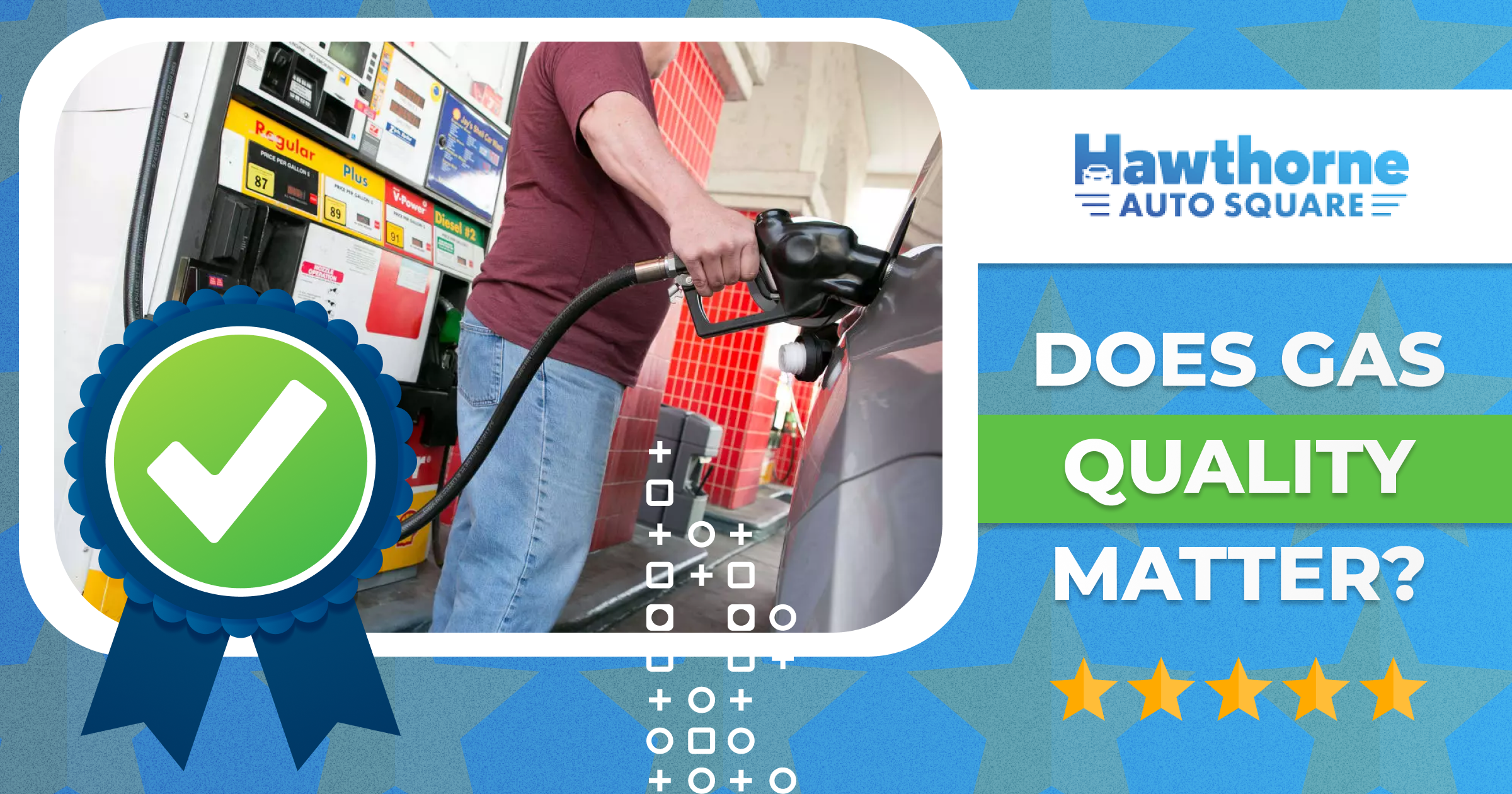
- SALES : (866) 707-7664
- PAYMENTS : (866) 902-7955
- 11646 PRAIRIE AVE, HAWTHORNE, CA 90250
- MON - SAT 8AM - 8PM | SUN 10AM - 6PM
- SALES : (866) 707-7664
- PAYMENTS : (866) 902-7955
- 11646 PRAIRIE AVE, HAWTHORNE, CA 90250
- MON - SAT 8AM - 8PM | SUN 10AM - 6PM
Does Gas Quality Matter?

Gas is a significant expense for any vehicle owner. Some types of gas are more expensive than others. While it usually won’t hurt to use the cheapest fuel, depending on your car, there are some differences in the types of gasoline sold. If you’ve been wondering, “Does gas quality matter?”, here is an explanation of how it can affect your vehicle.
Why Consider Top Tier Brands?
Top Tier gasoline contains more detergent additives than standard gas. The U.S. Environmental Protection Agency (EPA) has set standards for minimum amounts of detergent. To more effectively protect engines against carbon buildup and deposits, some brands exceed those. This can reduce knocking, pinging, rough idling, and hesitation upon acceleration. Higher quality gas also helps reduce engine wear, while fuel efficiency can be improved.
Shell, BP, ExxonMobil, and other major oil companies have adopted their own Top Tier standards regarding detergent content in gasoline. Many automakers support the use of Top Tier gas for higher precision engines. It has helped meet targets for improved engine performance and cleaner emissions.
The Use of Ethanol
Ethanol is another factor in evaluating the quality of gas. High-quality gas has about 10% ethanol, while less expensive gasoline may have 15% or more ethanol. Higher percentages of ethanol tend to reduce fuel economy so you may have to fill up more often. Check the owner’s manual; some manufacturers advise against using cheaper fuel, especially for cars with high compression engines.
Actual Impact of Gas Quality on Car Engines
In 2016, the American Automobile Association (AAA) tested engines in a specialized lab. As part of the study, each engine was run continuously for 100 hours, simulating 4,000 miles of use. The engines were disassembled later. Then different components were weighed and photographs were taken.
The thickness of carbon deposits was analyzed. Researchers found that engines with non-Top Tier gasoline had 19 times more carbon deposits than those run with Top Tier gas. The high-quality gas appeared to have a cleansing effect on the intake valves. Also, in analyzing gas prices over time, the difference between the two was found to equal just a few cents.1, 2
All Gas is Pretty Much the Same
No matter what gasoline you put in your car, it comes from petroleum transported via a pipeline to a refinery. Here, it’s made into gasoline, which is then brought by oil tankers to individual companies. By law, these companies are required to include additives. Each business has a proprietary blend of additives so the composition, quality, and quantity vary. However, those that provide Top Tier gas must treat all octane grades (regular, premium, diesel, etc.) the same.
It is possible to purchase generic gas with no additives. Ethanol-free gas is not as easy to find. Plus, it requires you to add fuel injector cleaner on your own for the engine to benefit at all from detergents.
Find Used Cars at Our Buy Here, Pay Here Dealership
Hawthorne Auto Square is proud to provide high-quality, low-mileage used vehicles to consumers in the Los Angeles area. “Does gas quality matter?” is one of many questions you should have when shopping for a used vehicle. We can help you find one that meets your wants and needs and that will give you reliable performance. Each vehicle is carefully inspected and prepared, but you’ll also receive a 6-month warranty to cover any service and maintenance. To learn more, browse our inventory online, inquire about financing, or get pre-approved for a loan.
Call 866-707-7664 to speak with us directly and/or make an appointment.
Latest News


Why Should I Buy a Used Toyota Camry?

Bankruptcy and Car Ownership: How BHPH Can Help


Used Car Price Trends for 2025: What Buyers & Sellers Need To Know
Get approved
It only takes a few minutes and won’t affect your credit.
- Pre-Inspected Cars
- Clean Title
- Under Warranty
Latest Videos
What Do I Need To Buy A Car - Hawthorne Auto Square
Second Chance for a New Car - Hawthorne Auto Square
Pre Approved Auto Lone – Hawthorne Auto Square
- SALES : (866) 707-7664
- PAYMENTS : (866) 902-7955
- 11646 PRAIRIE AVE, HAWTHORNE, CA 90250
- MON - SAT 8AM - 8PM | SUN 10AM - 6PM
© 2025 Hawthorne Auto Square. All Rights Reserved. Website Designed by: Ad Leverage | Privacy Policy | Terms of Service | Manage Cookies | DSAR |License #91864
© 2025 Hawthorne Auto Square. All Rights Reserved. Website Designed by:
Ad Leverage | Privacy Policy | Terms of Service
License #91864

